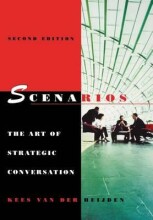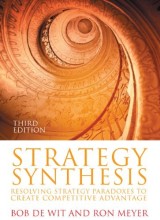Summary: Strategy Sheets
- This + 400k other summaries
- A unique study and practice tool
- Never study anything twice again
- Get the grades you hope for
- 100% sure, 100% understanding
Read the summary and the most important questions on Strategy Sheets
-
1 Introduction Scenario Planning as a tool for the strategic conversation
-
1.1 College 1: Context of Scenario Planning
This is a preview. There are 20 more flashcards available for chapter 1.1
Show more cards here -
Give two examples of short term strategy
1. Addictions (short term benefits outweigh long term health/survival)
2. The share holdervalue
-
Give two examples of long term strategy
1. Studying
2. Healthy food
-
Give some advantage of the business strategy?
- By investing time and money there you will be better prepared for the crisis: Crisis management
The revenu in the long term is higher than the cost in the shorter term.
- The result of good planning is good learning and memory. Less repeated mistakes --> Institutional learning
-
Give three reasons and one example why the importance for a good business strategy rises?
- The environment changes faster
- Therefore, the future is more and more unpredictable
- Fast reactions save money
Example: Oil industry in the 60s and 70s. Delivery of oil tankers.
Recent examples: flights, banks, cars.
-
What are external scenarios?
"Possibilities how the future would look like"
- Mental models of the external world
- Internal consistent and defiant(=uitdagend)
- Representing possible futures
- Wheter they will happen or not is out of sphere of influence
-
Which two different environments do we have?
1. Transactional
2. Contextual
-
What is the contextual environment?
(--> Focus of SP)
The world of actors over which the strategist has no influence but which he or she needs to appreciate as it effects him or her crucially --> The contextual environment has a significant influence on the business.
-
Why are scenarios for the contextual environment and not the transactional environment?
- Longer term trends
- Avoidance of the daily issues
- Stretching mental models, out of the box
-
Why can't we weight value judgements about scenarios?
- Strategy changes all the time, and is constantly updated
- Scenarios are neither good nor bad
- For the strategist there is no worst case scenario
- The organisation has to be succesful, regardless of the kind of future
-
What are the differences between scenarioplanning and other approaches of strategic planning?
- Attention for the uncertain business environment
- Strategy formulation is seen as a continuous learning process, not as problem optimizing
- Strategic planning is not only an issue for staff department, but for the board or better the whole organisation.
- Higher grades + faster learning
- Never study anything twice
- 100% sure, 100% understanding
Topics related to Summary: Strategy Sheets
-
Introduction Scenario Planning as a tool for the strategic conversation - Context of Scenario Planning
-
Principles of Scenario Planning - Strategising--> strategy as a loop, it is never finished - Strategy and Learning
-
Principles of Scenario Planning - Strategising--> strategy as a loop, it is never finished - Business Idea
-
Principles of Scenario Planning - Strategising--> strategy as a loop, it is never finished - The uncertain Environment
-
Principles of Scenario Planning - Strategising--> strategy as a loop, it is never finished - Scenario Analysis
-
Principles of Scenario Planning - Strategising--> strategy as a loop, it is never finished - Scenarios and the strategic conversation
-
The Practice of Scenario-based planning - The practitioner's art
-
Competitive Positioning - Scenario Development - Option Planning
-
Part Four: Institutionalising SBP - The Planning Process































